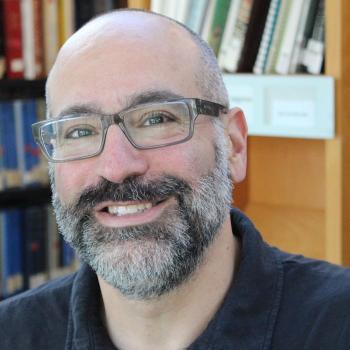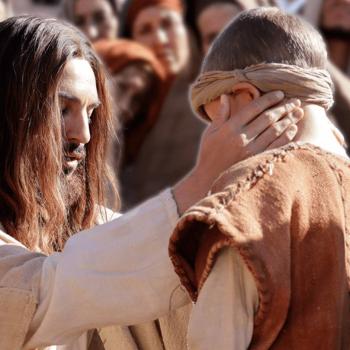There isn't the space, here, to go into detail on each of these six, so I will only summarize them. But one theme builds upon the next, and they all reveal a revolutionary, life-changing approach to life and faith. These themes from Francis's life were simple, even ordinary, just as Jesus taught.
Friendship. A strange place to start, I realize, but friendship had a primacy for Francis. If you think of the traditional qualities of a saint, they're usually courage, intellect, and compassion. Francis had these virtues, some of them in spades, but for him the list simply started elsewhere. His journey really began and ended with—and his charism comprised almost entirely—a true and unique gift for friendship. There were clear and distinct lines of gender, religion, and status in his culture and time, and Francis crossed them all. Had he not also been of unimpeachable motives and character, he probably would have been burned at the stake for it.
The Other. Francis saw a different world from the one perceived by most religious people of his time. He saw the "sacred" in everyone and everything and so was able to pay profound respect to invisible, discarded, and demonized people, creatures, and other unknowns. He had nothing to gain by doing so, but he included them as equals in his life. This inclusiveness was the essence of how he changed monasticism and how he believed every person should act in the world.
Poverty. The popularity of Francis's spiritual movement in the two decades between his conversion and death is almost without precedent in the history of Christianity. Other reforms within monasticism had shown quick growth, but not like early Franciscanism. In one of the most pregnant phrases of his little book about Francis, Chesterton wrote: "What St. Benedict had stored St. Francis scattered." This scattering was deliberate on Francis's part, as he made the values and spirituality of traditional monasticism available to everyday people everywhere. He took poverty on personally and voluntarily, within and for himself, rather than simply as a subject of concern in the lives of others. He did not make poverty a virtue in and of itself, but he focused attention on how being poor was a sure way to understand the message of Jesus. Then, fascinatingly, "being poor" was something people wanted to do, when they saw it lived out by Francis.
Spirituality. Francis lived at a time when the Church felt threatened by individual expressions of faith. One was only "spiritual" in church. Yet, Francis created ways for ordinary people to mark their lives as holy no matter where they were. Valued higher by Francis than theological understanding, his personal spiritual life set him apart from nearly every other leader in the church in his day.
Care. An awkward word all alone as a noun, but "care" best summarizes how Francis was almost Buddhist in his gentle attention to not just people and creatures, but things. This extended beyond humankind, to animals, fish, even rocks. Why? He was learning to be a lover of the Beatitudes. It was his care-full-ness in little things that made him the environmental saint we know today. In no other area do we see so clearly how Francis was a man ahead of his time.
Death. Francis embraced death, not as a fatalistic gift, as did the majority of medieval people who talked in macabre ways about life as a "dance with death," but as an important part of living. His welcoming of death was almost without precedent in Christian teaching and is more important than ever for First World people of all backgrounds to grapple with. Death was his Sister. In this area I believe the Poverello reveals himself to be a man even ahead of our time.
***
In these six ways, Francis forged a new path. He gained thousands of followers quickly when he was doing these things 800 years ago, but historians will also tell you that Francis died an unhappy man. Why? After the initial inspiration, his closest friends began to abandon the original ideals. The values of the people were slowly compromised. It all seemed too difficult. Being Christian in these six ways no longer seemed "realistic." So, even before Francis's death in October 1226, it was in many ways back to "business as usual" in what was already, by then, called Franciscanism.
Each of the six aspects of Francis of Assisi's spiritual vision seems eerily similar to what Pope Francis is doing. I wonder if the pope had in mind a revival of Franciscan proportions, based on what he has been doing over the last eighteen months.
Of course, it remains to be seen what we will do with Pope Francis's reviving of the spirit of Saint Francis among us. "Let us not allow ourselves to be robbed of the joy of the Gospel!" the Holy Father wrote in Evangelii Gaudium, an obviously leading, rhetorical question whose answer is "Amen," but then, "How?" Look to Francis of Assisi. I think it is helpful to look to the past, not simply to learn what happened, but to understand ourselves in the present. It was the novelist William Faulkner who said, "The past is never dead. It's not even past." That's true, or at least, it can be.




